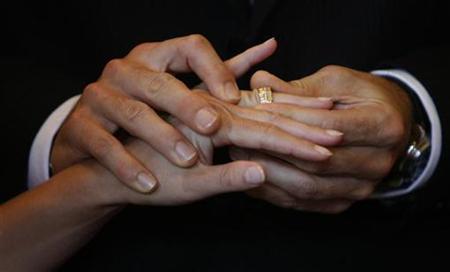One must say that the rates of unhappily-ever-after marriages and relationships are rising in Egypt. Recent studies show alarming numbers of official divorce rates; an indication of even more relationships that were not officially broken yet.
My divorced friends’ bitter discussions about how irresponsible, insensitive, non-appreciating their ex-s turned out to be after a year or more of marriage made me do some critical thinking about it; is it that people became generally worse? Or perhaps the problem is much deeper than that?
‘Better a man’s shadow than that of a wall’ is an Egyptian proverb encouraging women to get married; it is a social mandate for a woman to be respected and honored through marriage and having children. Finding ‘A’ one rather than ‘The’ one was good enough for most women because their main objective was to settle and have children.
Accordingly, a happy marriage to a woman meant settlement and having children to ‘tie the man up’ and keep that man’s ‘shadow’, according to Egyptian proverbs. A loving and caring husband was a plus no doubt, but not having such qualities wasn’t a deal-breaker as long as he was fulfilling his duties as the ‘man of the house’, being the provider.
What changed now is not just the definition of marriage, but the definition of happiness itself. Why do independent women get married nowadays? For both, men and women, with a special concentration on women, there is a growing global trend of ‘making your own happiness’, even if it challenges the norms of society.
Many girls now say it loud and clear that although they are open to relationships, their happiness is not man-dependent. Unlike their grandmas, neither are they obsessed with motherhood, some even discourage the idea, nor do they look for financial security or settlement. That is due to the fact that almost 24 percent of the population are women in the labor force.
These women seek relationships and marriages that make them happier than they already are, not equally happy and definitely not less happy. So, what defines a happy marriage? There is no one right answer to this question, and there shouldn’t be. For some, a happy marriage is one with the least possible arguments. For others, this could be the definition of a ‘normal’ rather than a ‘happy’ marriage. And a happy marriage is the one with the perfect physical harmony, kids, meaningful everyday conversations or a mix of many definitions.
However, one thing I know for sure is when someone marries another for a different reason than what’s declared, it is a ticking time bomb awaiting the next big fight to explode.
Rowing in opposite directions, one of my relatives, a never-married-before 62-year-old lady, recently got married to a man in his seventies. The mutual reason was the need for companionship; they both needed someone to share what’s left of their lives with. This, in my opinion, is a very legitimate reason to get married, given they both have nothing much, whether financially or emotionally, to risk. No one has higher hopes than the other and being together is enough for both, so they are rowing their ship in the same direction.
On the other hand, a common topic causing fights between married-with-children couples is the responsibility for the children. The wife argues that she takes full responsibility for the kids, and her husband is just a human ATM who is rarely involved in the family life. The husband argues back that a wife’s main priority is her house and children, and he will provide support if he has time or energy after completing his main responsibility, which is work.
The problem with such arguments is not about who is right or who is wrong; the big problem is that the definition of responsibility for children is inconsistent. It is like comparing apples to oranges. To her, a father is not the sole bread-winner for the family, especially if she is a working mother, and he has to share other house responsibilities, not just the financial ones. To him, a father is solely responsible for the financial welfare of the family, even if she is a working mother, and it is a huge enough burden to make a decent living for his children to accept any more of their responsibilities.
According to each person’s paradigm, rationale and background, they may have a solid argument. She was raised seeing her father equally splitting all responsibilities with her mother without a gender bias, and he was raised seeing a different way of task assignment and taking responsibilities. This is why involving parents-in-law to solve these issues rarely works. How do you expect your father-in-law to see his daughter guilty of something he raised her to believe? Do you think your mother-in-law will ever understand how you reject her concept of ‘a man is a man, and a woman is a woman’?
Since when does comparing apples to oranges work? Although post-marital changes are inevitable, couples must always be on the same page regarding critical issues that generate big fights. While still engaged, it is good to know how your significant other perceives abstract concepts like happiness and responsibility and how he or she is willing to translate them to marriage.
Role-play situations, discussing successful and failed marriages you know of, deciding your norms as a couple and not comparing yourself to others are good ways to get to know your partner and prevent potential future conflicts. It is natural to find out that the happy marriage model of your spouse-to-be is a bit different from yours, but make sure you both sort things out into a new ‘blended’ model of your own. A model that makes you row your relation’s ship into one common destination: happiness.




Comment (1)
[…] search for marriage in Egypt, articles about the negative reputation of marriage and the rise of broken homes are the first thing that pops on your screen. If you’re part of this generation and you live in […]